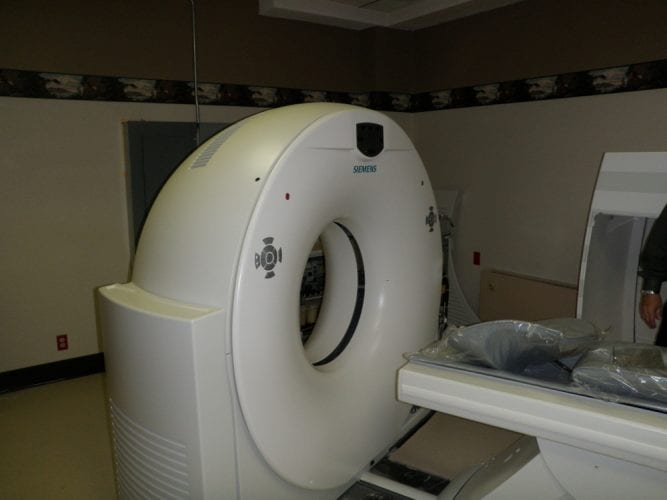
A CT scanner installed at Petersburg Medical Center in 2011. Laboratory services would be one of 10 essential health benefits for health insurance defined in one ballot initiative. (KFSK file photo)
A campaign has begun to gather signatures for two health-insurance ballot initiatives in Alaska. In early October, Lt. Gov. Byron Mallott certified the “Quality Health Insurance for Alaskans Act of 2018” and “Health Care for Alaskans Act of 2018.”
Alan Gross is an orthopedic surgeon and fisherman from Petersburg and says the measures are needed because of mixed signals coming from the nation’s capital on the future of health insurance.
“Our health care is being used like a chip and being passed back and forth and we need stability in our markets here in Alaska for insurance purposes,” Gross said. “We need stability in our markets so that patients can understand and come to expect certain benefits. And the way things are going right now in Washington, people don’t know on a day-to-day basis what the future of our health care plans is.”
Several Anchorage-based doctors are also involved in the effort.
One measure would enact in state law some of the provisions of the Affordable Care Act. They’re dependent coverage until age 26, no denials for pre-existing conditions and 10 types of essential services required to be covered. The measure, unlike the nationwide law, does not mandate health-insurance coverage.
The other measure would establish expanded eligibility for Medicaid and Denali KidCare in state law. That measure would also block cuts in the amount hospitals and other providers are reimbursed for Medicaid services. Gross said the expansion brought health coverage to people for drug addiction and mental health treatment who otherwise couldn’t afford it.
“With the Medicaid expansion people are able to not worry about getting health care despite making very little as far as income is concerned and hospitals and health care providers are being reimbursed for the health care that they would otherwise have been giving anyway for free, which has subsequently shifted the costs to people that are paying for health care through private policies,” Gross said.
The state’s analysis of the initiative applications notes that neither measure would require the state Legislature to fund the entitlements, which is prohibited under the state’s constitution. The power to appropriate money rests with the Legislature and can’t be done by ballot measure.
The state expanded Medicaid in 2015, loosening the income restrictions for people to qualify for coverage. The state’s legislative council sued the Walker administration over expansion but lost in court. More than 36,000 Alaskans have health insurance coverage because of that expansion. Overall, more than 191,000 people in the state are enrolled in Medicaid.
Premera Blue Cross Blue Shield of Alaska is the only company providing coverage on the individual market in the state. A spokesperson says that company is not taking a position on the ballot initiatives because of the ongoing discussion in Washington, D.C., that could take precedent over any action at the state level.
Alaska Chamber president Curtis Thayer said that organization has not yet taken a formal position on the measures. But he’s critical.
“So really taking parts of the Affordable Care Act and enshrining it again to a ballot initiative is just the wrong way to go,” Thayer said. “It really doesn’t make sense. The state’s expanded Medicaid. The chamber supported expanding Medicaid. So like I said this just seems like kind of an odd way to do public policy.”
The Chamber has lobbied for repeal or reform of the Affordable Care Act.
Supporters of the initiatives will need to gather more than 32-thousand signatures. And the signatures must come from voters in at least three-fourths of the House districts. They’re hoping to get the issues on the ballot for November of 2018.










